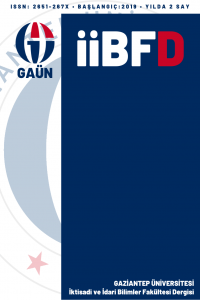VERGİ SİSTEMİNDE DOLAYLI VERGİLER VE GÜMRÜK VERGİSİNİN İNCELENMESİ:BİR KIRGIZİSTAN ÖRNEĞİ
Bu çalışmada Kırgızistan vergi sisteminde dolaylı vergiler incelenmiş olup, ağırlıklı olan dolaylı vergilerin Kırgızistan ekonomisine etkileri amaçlanmaktadır. Çalışmada Kırgız vergi sistemine ve KVS’de dolaylı vergiler arasındaki güm-rük vergisine teorik olarak değinilerek güncel ithalat ve ih-racat istatistiklerine de yer verilmiştir.1991’de Alma-atı Kon-feransı ile Bağımsız Türk Devletleri arasında yer alan Kır-gızistan SSCB’nin egemenliğinden kurtularak, kendi bağım-sızlığını ilan etti. SSCB’den ayrılışından kısa bir süre sonra Kırgızistan piyasa ekonomisine geçerek, liberal değişimler yaşamıştır. Bu sayede özelleştirme ağırlıklı politikaların izlenmesi ile diğer Bağımsız Türk Devletleri arasında önemli bir konuma getirilen Kırgızistan; kayıt dışı ekonomi ve mev-cut borçlar karşısında zor duruma düştüğünden dolayı, vergi reformlarını uygulamaya koymuştur. Bu bağlamda vergiler arasında dolaylı ve dolaysız vergilerin de Kırgız Vergi Sistemi içinde önemli bir yer tuttuğu görülür. Özellikle Kırgız Vergi Sisteminde dolaylı vergilerin ağırlıklı olduğu göze çarpmaktadır
Anahtar Kelimeler:
Vergi, dolaylı vergi, gümrük vergisi
INVESTIGATION OF INDIRECT TAXES AND CUSTOMS DUTY IN THE TAX SYSTEM: THE CASE OF KYRGZSTHAN
In this paper, indirect taxes are examined in Kyrgyzstan fiscal system and the effects of pre-dominantly excise taxes on kyrgyzstan's economy are aimed. In the study, the Kyrgyz tax system and customs duty between fiscal system in the Kyegyz fiscal system. were theoreti-cally mentioned,current import and export statistics were included.In 1991, Kyrgyzstan, which is among the Independent Turkish States with the Almaty Conference, got rid of the sovereignty of the USSR and declared its own independence. Shortly after leaving the USSR, Kyrgyzstan moved to the market economy and experienced liberal changes. In this way, Kyrgyzstan, which has been placed in an important position among other Independent Tur-kish States through the monitoring of privatization-oriented policies; He implemented tax re-forms because he was struggling with the informal economy and existing debts. In this con-text, it is seen that indirect and direct taxes are also an important part of the Kyrgyz tax sys-tem. It is especially noticeable that in the Kyrgyz tax system, indirect taxes are predominant.
___
- Akdoğan, A. (2002). Kamu Maliyesi, Ankara, 8. Baskı, Gazi Kitabevi, s. 186. Ataç, B. vd., Kamu Maliyesi (Ünite : 1–23), 7. Baskı, Es-kişehir: Anadolu Ünv.A.Ö.F. Yayınları No: 519 Abdiyeva, R., Özdil, T., & Pirimbayev, C. (2015). Geçiş Ekonomilerinde Vergi Kültürü ve Etkileyen Fak-törler: Kırgızistan Örneği, 0(75). 43-73.
- ISSN: 2651-267X
- Yayın Aralığı: Yılda 2 Sayı
- Başlangıç: 2019
- Yayıncı: Gaziantep Üniversitesi
